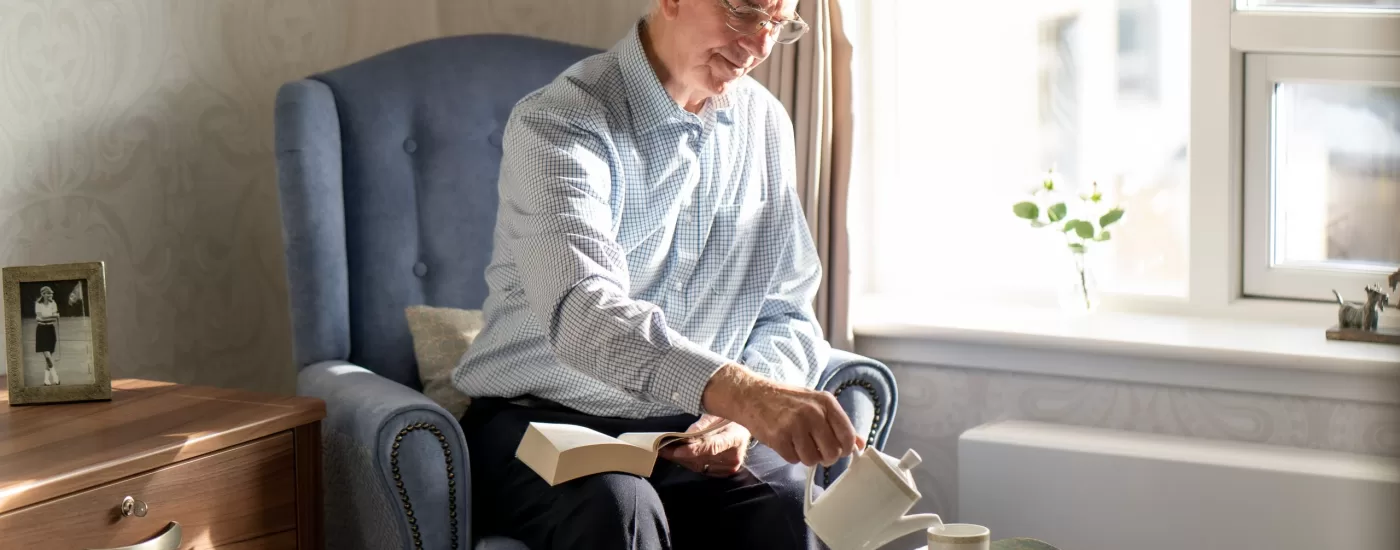
How can I best help my friend or loved one living with Dementia?
06 June 2022
The friendly team at Home Help Me Care (HHMC) are winners of the Scottish Care Awards End of Life Practice Award (2021) and Management & Leadership Award (2022). They are also Finalists for Care Provider of the Year (2022). They have lots of experience looking after those living with Dementia, providing care in people’s own homes. Here are five tips from HHMC to help with planning for future care and enabling your loved one to live a happy and supported future, whilst supporting those around them too.
1) Keep things ‘normal’.
Particularly in the early stages, someone living with Dementia can still be involved in everyday tasks such as shopping and laying the table. To make things easier, it can be helpful to label cupboards and doors to help them remember where things are. Social interaction and stimulation is key and supporting them with this is important – have people come to visit, go out to see friends and help the person living with Dementia remain active in any hobbies and interests they have. Some adjustments might be needed (like shorter visits, less busy/noisy places), but you’d be surprised how many people living with the earlier stages of Dementia continue to thrive and remain included in their community.
2) Make eating easy.
It’s common for people with more advanced stages of Dementia to find it difficult to eat or drink properly. This may be because their taste buds are affected, because they don’t actually realise they are hungry or thirsty, or because they have difficulty using cutlery or recognising food. Sometimes they can’t see the contrast of food against the plate. You can help by providing tasty food that you know the person likes in easy to manage portions, or as finger food. Offer drinks in cups that are easy to hold. Some people have set routines they like, so stick to these. This might involve simple things like knowing their favourite seat at the table, which napkins they like, and their favourite mug. Such small, thoughtful gestures can have a great impact. Set aside enough time for meals and take things nice and slow.
3) Be calm and reduce anxiety.
Many people living with Dementia become anxious when faced with everyday tasks – things like bathing or getting out and about. In addition, some people living with Dementia know they have the condition and it’s important to remember their feelings and respect their dignity. To reduce anxiety remain calm, ask them how they are feeling and what they want to do, and, of course, keep your sense of humour. It is important to take your time, to be reassuring and to make sure the things you and your loved one need are close at hand.
4) Communicate clearly.
Talking with someone living with Dementia is a vitally important way of keeping them engaged. When it comes to this communication, knowing a person’s likes and dislikes, and a bit of their life history is really useful. Make sure you maintain eye contact and speak clearly and slowly, but not in a condescending manner. Don’t be patronising, but ask simple questions to which they can give short answers. Limit options to a couple of things (e.g. “would you like tea or coffee,” rather than what “what drink would you like?”). Rephrase what you’re saying if necessary to aid understanding. If possible, encourage the person to talk about how they are feeling and to reminisce about their lives, focusing on happier life moments. Showing them photos of friends and family can really help, as can keeping them involved in decisions – and remember, try and do everything with a smile.
5) Look after yourself.
When a loved one is diagnosed with Dementia friends and families often feel a sense of loss and sadness, which is normal. In light of this, it is vital to remember that looking after your own health and wellbeing is very important – if you’re well you’ll be better placed to support your loved one. The worst thing to do is to exhaust yourself. So, make sure you access the help and support your eligible for. For example, you can register as a carer with your GP, and apply for a blue badge to aid getting around. In addition, check what training and benefits you can access by contacting the adult social services at your local council. Organisations like Vocal can offer practical and emotional guidance. Talk to other carers for support and advice – sharing experiences will help you feel like you’re not alone.
Discover more about the specialist Dementia Care services offered at Cramond Residence.

